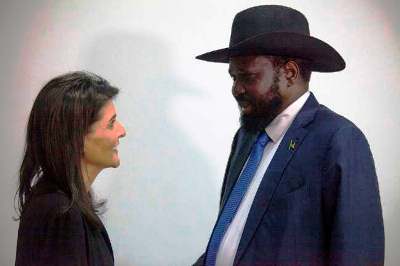U.S. lauds S. Sudan’s decision to allow free access for aid groups
November 15, 2017 (WASHINGTON) – The United States administration has welcomed a pledge from the South Sudanese President Salva Kiir to allow free movement for humanitarian agencies that have struggled to reach some of the war-torn country’s needy people.

During her visit, Haley told the South Sudanese leader that his U.S-backed government was at risk of losing future U.S. diplomatic and financial support.
The US, U.N monitors and various human rights organisations have, in the past, accused President Kiir of sanctioning ethnic warfare and atrocities against civilians.
But President Kiir, in a 9 November directive, ordered that all roadblocks be immediately cleared for international aid agencies to freely operate following numerous complaints from international aid agencies that found it hard to reach the most vulnerable people.
“Anybody who intentionally obstructs the delivery of Humanitarian Aid and services or imposes taxes on Humanitarian Convoys shall be held accountable,” partly read Kiir’s order.
Although the directive does not spell out what that means, the South Sudan leader has powers to sack or prosecute some wrongdoers.
“This is a good sign, but we must see actions — more than words — from President Kiir,” said Haley in a statement issued on Tuesday.
“The true test will be whether humanitarian assistance is actually allowed to get to the South Sudanese people in a consistent way. We will be watching, and we will continue to encourage President Kiir to do the right thing,” she added.
The U.N humanitarian coordinator for South Sudan, Alain Noudéhou also welcomed Kiir’s order, saying ensuring unhindered humanitarian access is essential for saving lives of those in need of aid.
“South Sudan’s humanitarian partners appreciate the step that President Kiir has taken to ensure the free movement of supplies and personnel, particularly at a time when food insecurity continues to deteriorate and humanitarian organizations face pressure to expand their response,” Noudehou said in a statement.
A confidential UN report to the Security Council on Friday accused South Sudan government of using food as a weapon of war to target civilians by blocking life-saving aid in some areas, an allegation a South Sudanese official described as “bias”.
Last month, a UN report said South Sudan’s government bears “primary responsibility” for incessant violence in the young nation.
The five-member panel established by the UN Security Council cited an absence of political will to implement a 2015 peace agreement and to address “the destructive governance practices and historical grievances that continue to drive the conflict in South Sudan.
The experts attributed these failures to the political and military elite of the country, with the primary responsibility for the ongoing violence resting with those in the government led by President Kiir and the first vice-president, Taban Deng Gai.
Neighbouring nations continue to experience adverse impacts of the nearly four-year-long civil war, yet are making no effective efforts to negotiate an end to the fighting, the report says.
The South Sudanese conflict has killed tens of thousands and displaced over two million people.
(ST)
